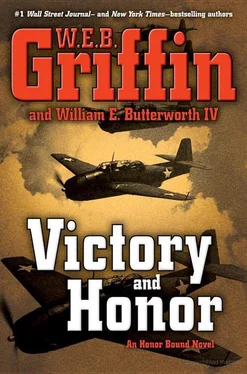Clete felt the hair on the back of his neck stand up.
Peter had told Clete that he’d seen von Stauffenberg in Munich and that the subject of regicide had been discussed.
Then, making Frade’s head really spin, Dulles broached the biggest secret: the Manhattan Project. He explained that the Americans were racing the Germans to develop an enormously powerful atom bomb from an element known as uranium.
“Whoever creates this bomb first is going to win the war. It’s as simple as that,” he said. Then, saying Graham shortly would TOP SECRET message him the same, he laid out Frade’s marching orders: “So your first priority is the immediate reporting of anything you hear about uranium or a superbomb.”
The next priorities, Dulles went on, were of equal importance: allowing the ransoming and Phoenix operations to continue while learning everything about them.
“As morally despicable as the ransoming is,” Dulles explained, “FDR says the bigger issue is saving lives wherever and however possible. If we were to expose the ransoming, the real result would be the extermination of all the Jews in concentration camps. And if we expose Phoenix, the Nazis will simply deny its existence. Letting it continue, however, allows us to trace the money from the moment it arrives in Argentina. You’ll create a paper trail of what was bought with it, and from whom. Plus the names of the officials—Argentine, Paraguayan, Uruguayan—who are being bought. Everything.
“The thinking is that if we went to General Ramírez or General Rawson now with what we have, or what you might dig up, they would tell us to mind our own business. The Argentines are not convinced the Germans have lost the war. But, while the Germans will hang on as long as possible, ultimately they will surrender unconditionally, as demanded by Roosevelt at the Casablanca Conference. And what that means, under international law, is that the moment the Germans sign the surrender document, everything the German government owns falls under the control of the victors. Things like embassy buildings, other real estate, bank accounts.
“Our ambassador will then call upon the Argentine foreign minister, present him with a detailed list of all German property in Argentina—which you will have prepared, to include bank account numbers, descriptions of real estate, et cetera—and inform him that we’re taking possession of it.
“The Argentine government may not like it, but it’s a well-established principle of international law, and it really would be unwise of them to defy that law. I rather doubt they will. Nations, like people, tend to try to curry favor with whoever has just won a fight.”
Cletus Frade then admitted that his head was indeed spinning, and suggested that he was way out of his depth, that starting up South American Airways was proving challenging enough.
Dulles replied: “Alec Graham said, vis-à-vis you, something to the effect that the first impression you give is of a dangerously irresponsible individual who should not be trusted out of your sight. And then, depending on how much experience one has with really good covert intelligence officers, one comes to the realization that one is in the company of a rare person who seems to be born for this sort of thing.”
Frade had considered that, wondered how much of it was smoke being blown up his ass, then said: “Does that mean you’re going to tell me what this airline business is all about?”
“Alec and I talked about that, and General Donovan told me he’d asked the President. No one knows anything except that Franklin Delano Roosevelt thinks it’s a good idea, and that he was pleased to learn of your remarkable progress in getting one going.”
Two years later, Frade—who now knew a helluva lot more than he wanted about the usefulness of South American Airways and about the secret German operations—picked up the telephone from the lower shelf of the table next to his chair. He crisply announced, “Area Commander Frade speaking, sir.”
He heard Allen W. Dulles chuckle.
“How was your flight from Washington, Area Commander?” Dulles asked.
“How did you hear about that?”
“I spoke with someone who began the conversation along the lines of ‘I’m glad you’re there. You won’t believe what Alec’s loose cannon just did with a pair of POWs at Fort Hunt.’”
“From that I infer ‘there’ is ‘here,’ right?” Frade said.
“I’m in the Alvear Palace.”
“And you’re here because of what allegedly happened in Washington? I don’t understand . . .”
“In part that. I thought we—you, me, and those allegedly sprung from Fort Hunt—need to discuss some new developments, ones that have come up in the week since you and I last spoke in Lisbon—”
“Oh, do we absolutely have to talk!” Frade announced.
“—and so,” Dulles went on, “believing that because you had just flown the Atlantic you probably would spend at least a day or two in the bosom of your family, I went back to Lisbon and caught the very next South American Airways flight to Buenos Aires.”
He paused, chuckled, then went on: “Tangentially, an observation or two about that: Your airline must be making money, Cletus. I was lucky to get a seat. Every one got sold, despite the outrageous prices you’re charging for a ticket. Many of the seats were occupied by Roman Catholic clergy of one affiliation or another. I decided that Buenos Aires must be overflowing with sinners for the Pope to spend so much money rushing all those priests, brothers, and nuns over here to save souls.”
Clete laughed.
“I’ll tell Father Welner what you said,” he said.
“Have you seen the good Father lately?”
“He met the airplane and he’s here now. Having his lunch. He and General Martín—they met the plane and said we had to talk.”
“Do they know about von Wachtstein and Boltitz?” Dulles said.
“Welner handed them—in front of Martín—Argentine identity documents stating that they’d immigrated to Argentina in 1938.”
“Then what Martín probably wants to talk about is what should be done with them in the immediate future. So far as a great many Germans in Argentina are concerned, both are traitors to the Thousand-Year Reich.”
“Not only Argentine Germans,” Frade said, “but I’d say at least half of the newly converted clergy —of the sort you said were on your flight—also think they’re traitors. I don’t mind the good Germans, but I’ve about had enough of these Kraut bastards.”
Dulles didn’t reply immediately. Then he said, “Understood. We need to discuss that, too.”
“So,” Frade said, “can you tell me about these new developments you just mentioned?”
And why they are so important that you came all the way here to tell me about them?
“When can we get together?” Dulles said. “I don’t want to talk about them on the phone.”
“I don’t think you want to come here to Uncle Willy’s house.”
“Not if Martín and Father Welner are there, Cletus.”
“Okay. Well, what I’m planning now—and, unless I’m given a good reason not to, what I’m indeed going to do—is spend the night here, then load everybody on the Red Lodestar and fly them out to Estancia San Pedro y San Pablo. From there, I don’t know.”
“Okay.”
“So then why don’t you drop by Jorge Frade about nine tomorrow morning and fly out to the estancia with us? Martín and Welner aren’t going.”
“Very well. I’ll see you at the airport at nine,” Dulles said, and hung up.
Estancia San Pedro y San Pablo Near Pila, Buenos Aires Province Republic of Argentina 1005 12 May 1945
Читать дальше












